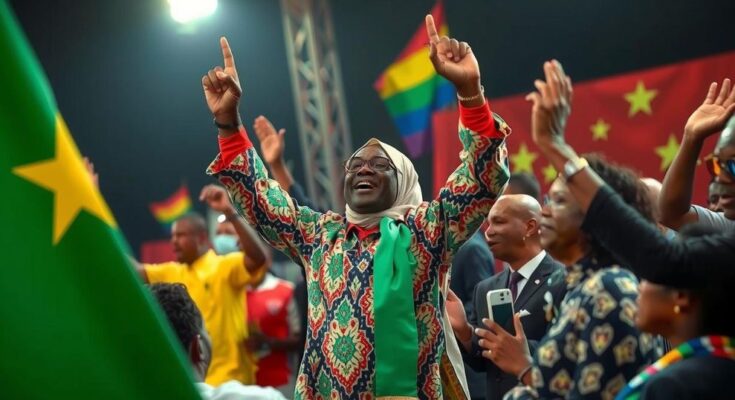Senegal’s ruling party, Pastef, has proclaimed a significant victory in the recent legislative elections, bolstering President Bassirou Diomaye Faye’s mandate to pursue economic and social reforms. The elections saw concessions from key opposition leaders, with a peaceful yet occasionally tense environment noted. The ruling party aims to secure 83 seats in the National Assembly but faces substantial challenges ahead.
In the recent legislative elections held in Senegal, the ruling party, Pastef, has declared a significant victory, asserting a commanding majority based on preliminary vote counts. A win for Pastef is anticipated to strengthen President Bassirou Diomaye Faye’s mandate, enabling him to advance his ambitious agenda of economic and social reforms initiated upon his election in March. Key opposition figures, including former Prime Minister Amadou Ba and Dakar’s mayor Barthelemy Dias, have conceded defeat as the counting progresses. The parliamentary elections proceeded without major incidents, although some pre-election tensions were noted. Government spokesman Amadou Moustapha Ndieck Sarre expressed gratitude towards the Senegalese citizens, stating, “We are proud of the Senegalese people and we would like to thank them for the large victory that it has given to Pastef.” Despite the ruling party’s confidence, specific seat counts remain undisclosed at this stage; Pastef aims for 83 seats in the 165-member National Assembly. President Faye, along with his Prime Minister Ousmane Sonko, who was prohibited from running for presidency, faced challenges in passing their proposed reforms in the previously opposition-dominated parliament. Their campaign centered on promises of significant reforms, highlighting a desire to rethink Senegal’s ties with France, the former colonial power. The youthful leader, aged 44, has garnered support from young citizens through pledges surrounding economic improvement, social equity, and anti-corruption efforts. Despite the prevailing optimism, the administration is poised to confront formidable obstacles, particularly concerning the country’s high unemployment rates and unstable financial conditions. Former President Macky Sall, who provides opposition leadership from abroad, has claimed extensive electoral fraud attributed to Pastef, although he has not offered concrete details to support these allegations.
The recent legislative elections in Senegal mark a critical juncture for the ruling party, Pastef, led by President Bassirou Diomaye Faye. This electoral event is significant not only for the immediate implications on legislative power but also for the broader socio-economic reforms promised by the government. The political landscape is often characterized by tensions between ruling and opposition parties, with underlying issues regarding youth unemployment and economic stability playing a crucial role in the national discourse. The electoral process has garnered scrutiny, with accusations of fraud from key opposition figures, highlighting the contentious environment in which these elections occurred.
In conclusion, the recent claim of victory by the ruling party, Pastef, in Senegal’s legislative polls indicates a pivotal development for the current administration, promising to facilitate the implementation of its radical reform agenda. While the peaceful conduct of the elections reflects a commitment to democratic processes, the ongoing challenges, such as unemployment and allegations of electoral fraud, suggest a complicated path ahead for President Faye’s government. Support from the youth and a possible shift in legislative dynamics may shape Senegal’s political future significantly.
Original Source: www.bbc.com




